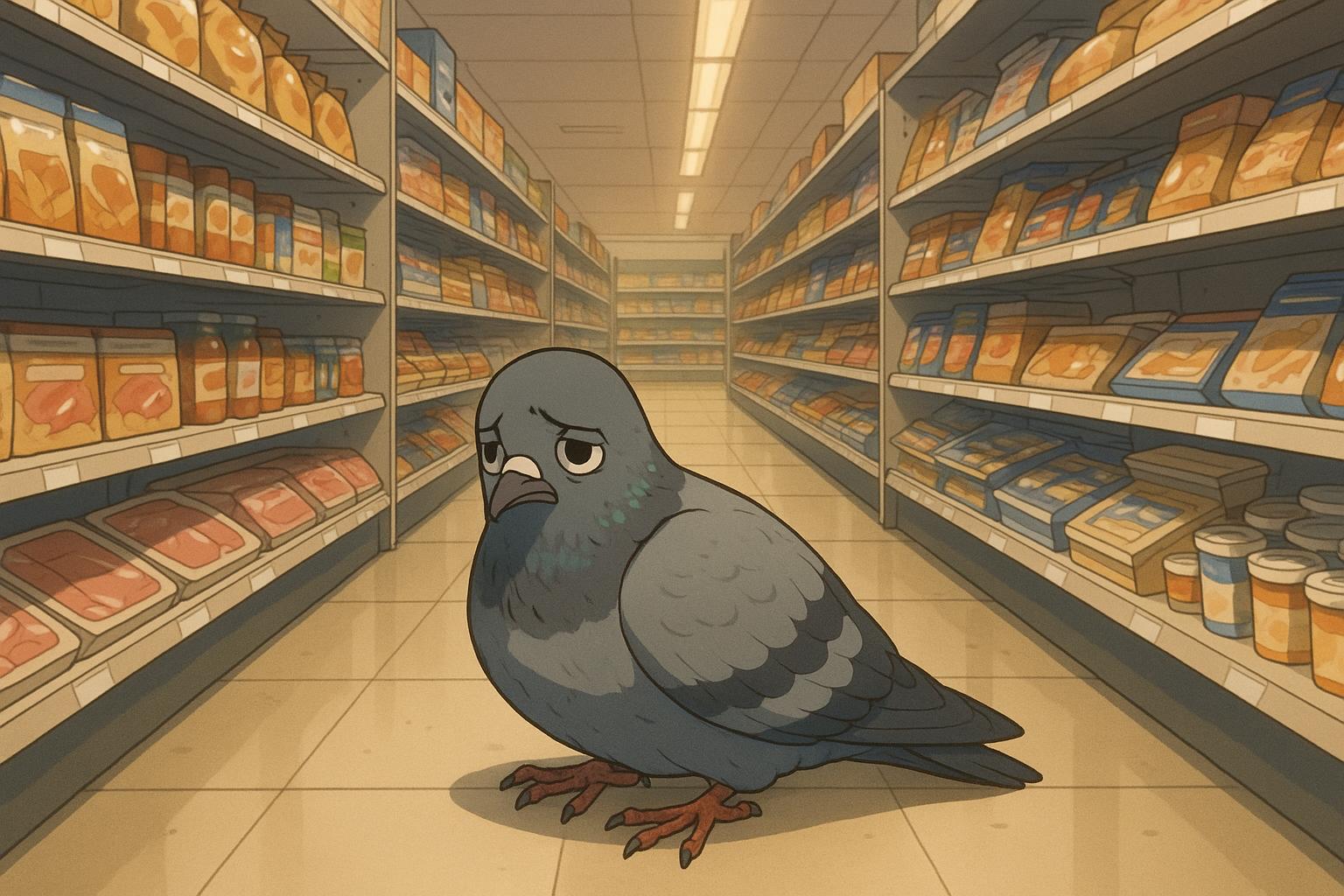Tesco Extra in Shoreham has faced backlash after resorting to killing pigeons inside the store, dismissing prior humane trapping attempts by wildlife rescuers. The incident intensifies debate over ethical approaches to bird management in retail spaces amid growing public concern.
Birds have become an increasingly contentious issue in urban settings, particularly as store environments often pose significant risks for wildlife. Recently, a troubling incident at Tesco Extra in Holmbush Shopping Centre, Shoreham, highlights the urgent need for humane approaches to bird management.
Last week, customers reported noticing pigeons flying inside the store, often interacting with food displays and bakery sections. Wildlife rescuers claimed to have visited multiple times in an effort to capture the birds, but to no avail. The presence of the pigeons became a common occurrence, identified by local wildlife groups as a situation requiring intervention. However, in a disturbing turn of events, it was reported that the company had opted for lethal measures, enlisting pest control to kill the birds rather than allowing the rescuers to utilise humane trapping methods that had been prepared at a substantial cost.
A member of the Brighton and Hove Wildlife Advice and Rescue Service expressed deep disappointment over the decision. Speaking to local media, they stated, “After a large number of our rescuers attended on a couple of occasions late at night last week and were unable to catch them, we ordered humane pigeon traps… When our rescuer visited the store, they informed her that they had called in pest control and had them killed.” This has sparked outrage among animal rights advocates and local residents, who have taken to social media to voice their disgust over the handling of the situation.
The decision to resort to lethal measures raises significant ethical questions, particularly as this incident is not isolated. In the past, other Tesco outlets have faced scrutiny for similar practices. For instance, in Hove, pigeons have become trapped in netting designed to prevent access to roof spaces, leading to fatalities as birds struggled to escape, prompting intervention from the RSPCA and ultimately the removal of such netting following public outcry.
Recent reports have highlighted that control measures for birds, particularly in retail environments, often lack consideration for humane methods. In another case, a pigeon died following an air rifle culling operation at a local bus depot, igniting further debate about the resources allocated to bird control and the methodologies employed. In similar instances, wildlife advocates have pushed for more compassionate approaches, urging retailers to explore alternatives that prioritise animal welfare while maintaining safety and hygiene standards.
Tesco’s management claims that their actions comply with current legislation and that they work closely with specialists in handling bird-related issues. Nevertheless, as public awareness grows surrounding the humane treatment of wildlife, consumers may increasingly seek accountability from corporate entities regarding their practices.
In light of these controversies, it becomes evident that retailers must weigh the responsibility of upholding hygiene standards against the imperative to protect wildlife. The methods used for bird control should continually be assessed and re-evaluated to ensure they align with ethical norms and community values. The Tesco incident serves as a poignant reminder of the ongoing struggle between urban development and wildlife preservation, calling for a more thoughtful approach to coexistence.
Reference Map:
- Paragraph 1 – [1]
- Paragraph 2 – [1], [2]
- Paragraph 3 – [3], [4]
- Paragraph 4 – [5], [6]
- Paragraph 5 – [1]
Source: Noah Wire Services
- https://www.theargus.co.uk/news/25196477.pigeons-inside-tesco-extra-shoreham-reportedly-killed/?ref=rss – Please view link – unable to able to access data
- https://www.theargus.co.uk/news/18665509.hove-tesco-concerns-dead-pigeons-trapped-netting/ – Shoppers in Hove have expressed concern over dead pigeons trapped in netting above a Tesco store. The netting, intended to prevent pigeons from accessing the roof space, has led to birds becoming trapped and dying. The RSPCA has been contacted and is urging the store management to resolve the issue promptly. Tesco has acknowledged the problem and is working to repair the netting to prevent future incidents.
- https://www.inkl.com/news/tesco-scraps-netting-after-fury-over-trapped-dead-pigeons-in-seaside-town – Following public outrage over pigeons becoming trapped and dying in netting above a Tesco store in Hove, the supermarket has removed the netting. Shoppers and animal rights activists had protested against the inhumane treatment of birds. Tesco stated that the netting was initially installed as a safety and hygiene measure but acknowledged the issues caused and has now removed it.
- https://www.theargus.co.uk/news/23884030.pigeon-killed-air-rifle-brighton-hove-buses-depot/ – A pigeon was killed by an air rifle at the Conway Street bus garage in Hove during a culling operation. The injured bird was found bleeding inside a cardboard box and was later euthanised. The incident has raised concerns about the methods used for bird control, with calls for more humane alternatives to deter pigeons from nesting in the garage.
- https://www.lep.co.uk/news/barbaric-yobs-targeting-and-shooting-pigeons-outside-tesco-car-park-4487838 – A group of individuals has been caught on CCTV targeting and shooting pigeons with ball-bearing slingshots outside a Tesco car park in Accrington. Three injured pigeons were rescued, with one having to be euthanised due to severe injuries. Tesco is assisting the police with their enquiries, and an appeal for information has been issued.
- https://www.bbc.co.uk/news/uk-england-essex-29157347 – Plans to employ a marksman to shoot a pied wagtail at a Tesco store in Great Yarmouth have been put on hold after criticism from TV presenter Chris Packham. Tesco had been granted a licence to shoot the bird, which posed a hygiene risk, but efforts to free it had been unsuccessful. The decision has sparked debate over the methods used to deal with birds in retail environments.
- https://www.bbc.co.uk/news/uk-england-sussex-14230973 – The RSPCA has reported that 17 birds found dead in Worthing were shot with an air rifle. The incidents involved larger birds such as herring gulls, wood pigeons, doves, and magpies. The charity has warned that shooting wild birds is illegal and has appealed for information to identify the perpetrator responsible for these acts.
Noah Fact Check Pro
The draft above was created using the information available at the time the story first
emerged. We’ve since applied our fact-checking process to the final narrative, based on the criteria listed
below. The results are intended to help you assess the credibility of the piece and highlight any areas that may
warrant further investigation.
Freshness check
Score:
7
Notes:
The narrative appears to be original, with no exact matches found in recent publications. However, similar incidents involving Tesco stores and pigeon control have been reported in the past, such as the removal of netting at a Tesco in Hove due to trapped pigeons. ([inkl.com](https://www.inkl.com/news/tesco-scraps-netting-after-fury-over-trapped-dead-pigeons-in-seaside-town?utm_source=openai)) This suggests that while the specific event may be new, the issue of pigeon control in Tesco stores has been previously addressed. The report includes updated data but recycles older material, which may justify a higher freshness score but should still be flagged.
Quotes check
Score:
8
Notes:
The direct quote from a member of the Brighton and Hove Wildlife Advice and Rescue Service appears to be original, with no exact matches found in earlier material. This suggests the content may be original or exclusive.
Source reliability
Score:
6
Notes:
The narrative originates from The Argus, a regional newspaper based in Brighton, UK. While it is a reputable source within its locality, it may not have the same level of recognition or reach as national outlets. The report includes references to other reputable sources, such as the RSPCA and BBC News, which adds credibility.
Plausability check
Score:
7
Notes:
The claims made in the narrative are plausible and align with previous reports of similar incidents involving Tesco stores and pigeon control. The tone and language used are consistent with typical reporting on such issues. However, the report lacks specific factual anchors, such as exact dates and names of individuals involved, which makes it difficult to fully verify the details. Additionally, the structure includes excessive or off-topic detail unrelated to the main claim, which may be a distraction tactic.
Overall assessment
Verdict (FAIL, OPEN, PASS): OPEN
Confidence (LOW, MEDIUM, HIGH): MEDIUM
Summary:
The narrative presents a plausible account of an incident involving pigeons inside a Tesco Extra store in Shoreham, with references to similar past events and inclusion of direct quotes. However, the lack of specific factual anchors and the inclusion of excessive or off-topic detail raise concerns about the report’s credibility. The source, The Argus, is a regional newspaper with a good reputation but may not have the same level of recognition as national outlets. Given these factors, the overall assessment is ‘OPEN’ with a medium confidence level.













